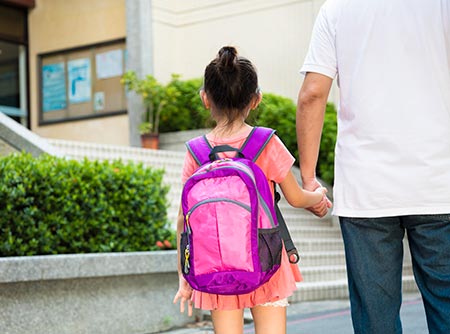
Exploring school with your child when classes begin can help ease separation anxiety. Consider talking to the school psychologist if back-to-school anxiety doesn’t subside after a week or two.
It’s normal for kids to feel nervous about a new schedule, teacher and classmates when heading back to school.
For some kids, anxiety starts weeks before classes are in session and continues once the school year begins.
Help ease their fears by getting them excited and ready to be back in school. Talk to your child about what’s wrong and seek help from a school counselor or child psychologist if the anxiety continues.
Get excited, prepared for school
“Make the process of going back to school fun,” said Brennan Young, Ph.D., a Marshfield Clinic child psychologist. “Talk it up and be excited about it as a parent.”
Involve kids in back-to-school shopping. Talk about good things you’ve heard about their new teachers and fun things they’ll learn. Prepare kids for a successful year by spending 15-20 minutes a day reviewing what they learned last year and getting them back on a sleep schedule.
Once classes start, praise anxious children for having good days at school and create a reward system for multiple successful school days.
Get to the root of the problem
Kids who are having problems at school may cry at drop off, refuse to go in the building or have frequent stomach aches or headaches in the morning.
Ask what makes school difficult. These common challenges can make school unpleasant for kids:
- Separation anxiety. Some kids fear something bad will happen to them or their parents if they’re separated.
- Learning problems. Ask your child if he has trouble paying attention in class, doesn’t understand the information or worries about taking tests.
- Problems getting along with others. Your child may be getting bullied by classmates or have trouble getting along with teachers.
- Loud, busy school environments are stressful for some kids.
“The better you can understand why your child doesn’t want to go to school, the easier it is to do some problem solving,” Young said.
Make back-to-school better
Making school a comfortable place for your child may involve efforts at home and help from a school counselor or child psychologist.
If separation anxiety is the problem, don’t get in the habit of letting your child stay home. Drop him off quickly and allow him to adjust to school. If that doesn’t work, slowly expose him to the situation he’s afraid of by letting him explore school with you and then alone. Reward him when he tries something new or does well.
Talk to your child’s teacher about suspected learning problems and whether evaluation for learning disabilities is needed.
Give children advice on how to handle bullying and follow up to find out if it’s working. Contact the school counselor or psychologist if bullying continues.
“It’s the adults’ responsibility to protect kids from being bullied and to teach bullies they need to get along with others,” Young said.
A child psychologist can help kids learn to cope with general anxiety about school, social situations and stressful environments.

